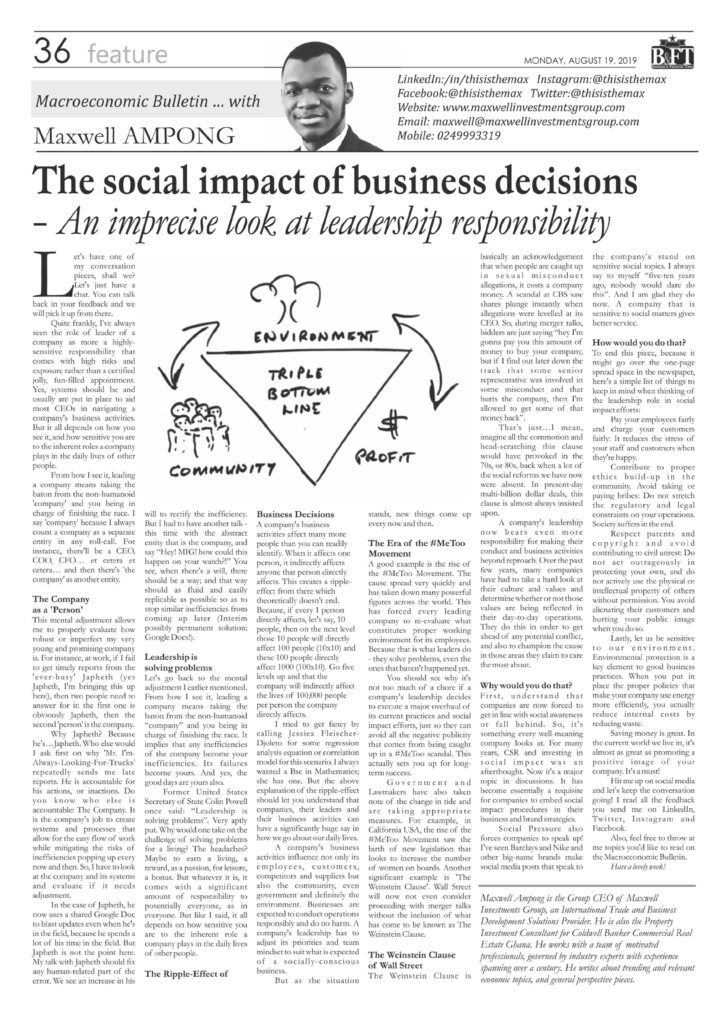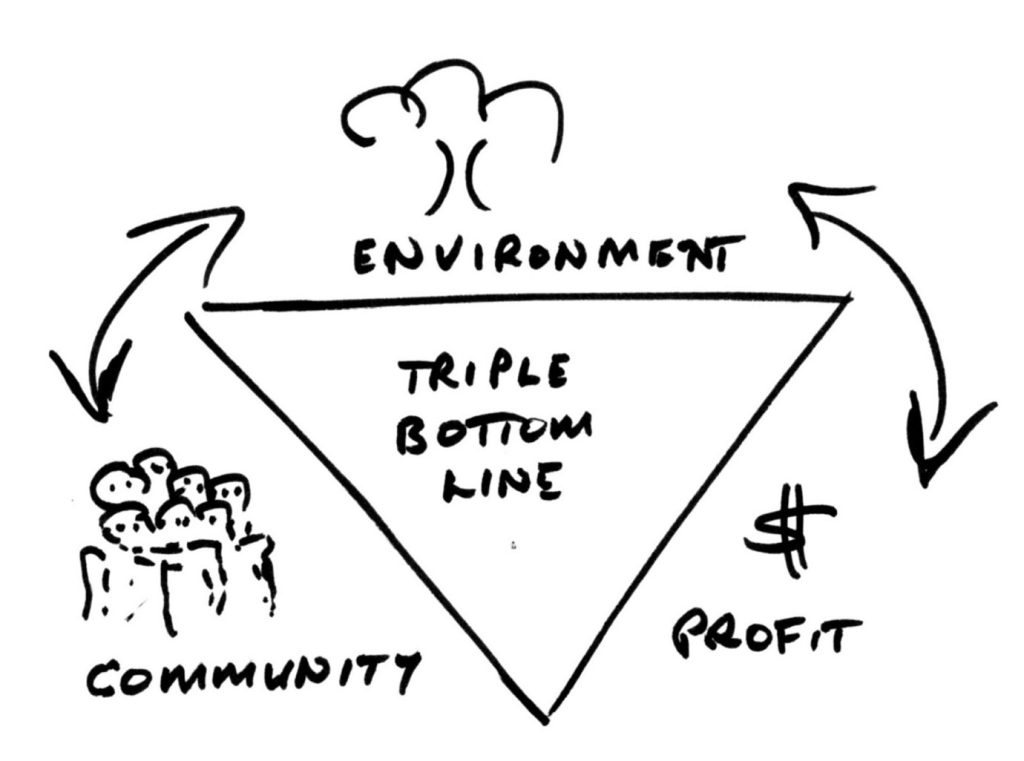
Let’s have one of my conversation pieces, shall we? Let’s just have a chat. You can talk back in your feedback and we will pick it up from there.
Quite frankly, I’ve always seen the role of leader of a company as more of a highly sensitive responsibility that comes with high risks and exposure rather than a certified jolly fun-filled appointment. Yes, systems should be and usually are put in place to aid most CEO’s in navigating a company’s business activities. But it all depends on how you see it and how sensitive you are to the inherent roles the company plays in the daily lives of other people.
From how I see it, leading a company means taking the baton from the non-humanoid “company” and YOU being in charge of finishing the race. I say “company” because I always count a company as a separate entity in any roll call. For instance, there’ll be a CEO, COO, CFO… et cetera et cetera… and then there’s “the company”, as another entity.
The Company as A “Person”
This mental adjustment allows me to properly evaluate how robust or imperfect my very young and promising company is. For instance, at work, if I fail to get timely reports from the ever “busy” Japheth (yes Japheth, I’m bringing this up here), then two people need to answer for it: the first one is obviously Japheth, then the second “person” is the company.
Why Japheth? Because he’s… Japheth. Who else would I ask first on why Mr I’m-Always-Looking-For-Trucks repeatedly sends me late reports. He is accountable for his actions, or inactions. Do you know who else is accountable: THE COMPANY. It is the company’s JOB to create systems and processes that allow for the easy flow of work while mitigating the risks of inefficiencies popping up every now and then. So I have to look at the company and its systems and evaluate if it needs adjustment.
In the case of Japheth, he now uses a shared Google Doc to blast updates even when he’s in the field, because he spends a lot of his time in the field. But Japheth is not the point here. My talk with Japheth should fix any human-related part of the error. We see an increase in his will to rectify the inefficiency. But I had to have another talk but this time with the abstract entity that is the company and say “Hey! MIG! how could this happen on your watch?!” You see, when there’s a will, there should be a way, and that way should as fluid and easily replicable as possible so as to stop similar inefficiencies from coming up later. Interim possibly permanent solution: Google Docs!
Leadership is solving problems
Let’s go back to the mental adjustment I earlier mentioned. From how I see it, leading a company means taking the baton from the non-humanoid “company” and YOU being in charge of finishing the race. It implies that any inefficiencies of the company become your inefficiencies. It’s failures become yours. And yes the good days are yours also.
Former United States Secretary of State Colin Powell once said “Leadership is solving problems”. Very aptly put. Why would one take on the challenge of solving problems for a living? The headache! Maybe to earn a living, a reward, as a passion, for leisure, a bonus. But whatever it is, it comes with a significant amount of responsibility to potentially everyone, as in EVERYONE. But like I said, it all depends on how sensitive you are to the inherent role the company plays in the daily lives of other people.
The Ripple-Down Effect of Business Decisions
A company’s business activities affect many more people than you can readily identify. When it affects one person, it indirectly affects anyone that the person directly affects. That creates a ripple effect from there which theoretically doesn’t end. Because, if every 1 person directly affects, let’s say, 10 people, then on the next level those 10 people will directly affect 100 people (10×10) and these 100 people directly affect 1000 (100×10). Go five levels up and that the company will INDIRECTLY affect the lives of 100,000 people PER PERSON THE COMPANY DIRECTLY AFFECTS.
I tried to get fancy by calling Jessica Fleischer-Djoleto for some regression analysis equation or correlation model for this scenario. I always wanted a Bsc in Mathematics; she has one. But the above explanation of the ripple effect should let you understand that companies, their leaders and their business activities can have a significantly huge say in how we go about our daily lives.
A company’s business activities influence not only its employees, customers, competitors and suppliers but also the community, even the government, and definitely the environment. Businesses are expected to conduct its operations responsibly and do no harm. A company’s leadership has to adjust its priorities and the team mindset to suit what is expected of a socially conscious business.
But as the situation stands, new things come up every now and then.
The Era of the #MeToo Movement
A good example is the rise of the #MeToo Movement. The cause spread very quickly and it has taken down many powerful figures across the world. This has forced every leading company to re-evaluate what constitutes proper working environment for its employees. Because that is what leaders do, they solve problems, even the ones that haven’t happened yet.
You should see why it’s not too much of a chore if a company’s leadership decides to execute a major overhaul of the company’s current practices and its social impact efforts just so they can avoid all the negative publicity that comes from being caught up in a #MeToo scandal. This actually sets you up for long-term success.
Government and Lawmakers also have taken note of the change in tide and are taking appropriate measures. For example, in California USA, the rise of the #MeToo Movement saw the birth of new legislation that looks to increase the number of women on boards. Another significant example is “The Weinstein Clause”. Wall Street will now not even consider proceeding with merger talks without the inclusion of what has come to be known as The Weinstein Clause.
The Weinstein Clause of Wall Street
The Weinstein Clause is basically an acknowledgement that when people are caught up in sexual misconduct allegations, it costs a company money. A scandal at CBS saw shares plunge instantly when allegations were levelled at its CEO. So during merger talks, bidders are just saying “hey I’m gonna pay you this amount of money to buy your company, but if I find out later down the track that some senior representative was involved in some misconduct and that hurts the company, then I’m allowed to get some of that money back”.
That’s just… I mean imagine all the commotion and head-scratching this clause would have invoked in the 70’s, or the 80’s, back when a lot of the social reforms we have now were absent. In present-day multi-billion dollar deals, this clause is almost always insisted upon.
A company’s leadership now bears even more responsibility of making the conduct and business activities beyond reproach. Over the past few years, many companies have had to take a hard look at their culture and values and determine whether or not those values are reflected in their day-to-day operations. They do this in order to get ahead of any potential conflict and also to champion the cause in those areas they claim to care the most about.
Why would you do that?
First understand that companies are now FORCED to get in line with social awareness or fall behind. So it’s something every well-meaning company looks at. For many years CSR and investing in social impact was an afterthought. Now it’s a major topic in discussions. It has become essentially requisite for companies to embed social impact procedures in their business and brand strategies.
Social Pressure also forces companies to speak up! I’ve seen Barclays and Nike and other big-name brands make social media posts that speaks to the company’s stand on sensitive social topics. I always say to myself “five-ten years ago, nobody would dare do this”. And I am glad they do now. A company that is sensitive to social matters gives better service.
How would you do that?
To end this piece, because it might go over the one-page spread space in the newspaper, here’s a simple list of things to keep in mind when thinking of leadership role in social impact efforts:
Pay your employees fairly and charge your customers fairly. It reduces the stress of your staff and customers when they’re happy.
Contribute to proper ethics build-up in the community. Avoid taking or paying bribes. Do not stretch the regulatory and legal constraints on your operations. Society suffers on the end.
Respect patents and copyright and avoid contributing to civil unrest. Do not act outrageously in protecting your own and do not actively use the physical or intellectual property of others without permission. You avoid alienating their customers and hurting your public image when you do so.
Lastly, let us be sensitive to our environment. Environmental protection is a key element to good business practices. When you put in place the proper policies that make your company use energy more efficiently, you actually reduce internal costs by reducing waste.
Saving money is great. In the current world we live in, it’s almost as great as promoting a positive image of your company. It’s a must!
I hope you found this article insightful and enjoyable. Subscribe to the ‘Entrepreneur In You’ newsletter here: https://lnkd.in/d-hgCVPy.
I wish you a highly productive and successful week ahead!
♕ —- ♕ —- ♕ —- ♕ —- ♕
Disclaimer: The views, thoughts, and opinions expressed in this article are solely those of the author, Dr. Maxwell Ampong, and do not necessarily reflect the official policy, position, or beliefs of Maxwell Investments Group or any of its affiliates. Any references to policy or regulation reflect the author’s interpretation and are not intended to represent the formal stance of Maxwell Investments Group. This content is provided for informational purposes only and does not constitute legal, financial, or investment advice. Readers should seek independent advice before making any decisions based on this material. Maxwell Investments Group assumes no responsibility or liability for any errors or omissions in the content or for any actions taken based on the information provided.


